Mindfulness can profoundly improve relationships by fostering better communication and emotional awareness between partners. By practicing mindfulness techniques such as mindful breathing and active listening, couples can cultivate a deeper connection and reduce conflict, ultimately enhancing their overall relationship satisfaction.
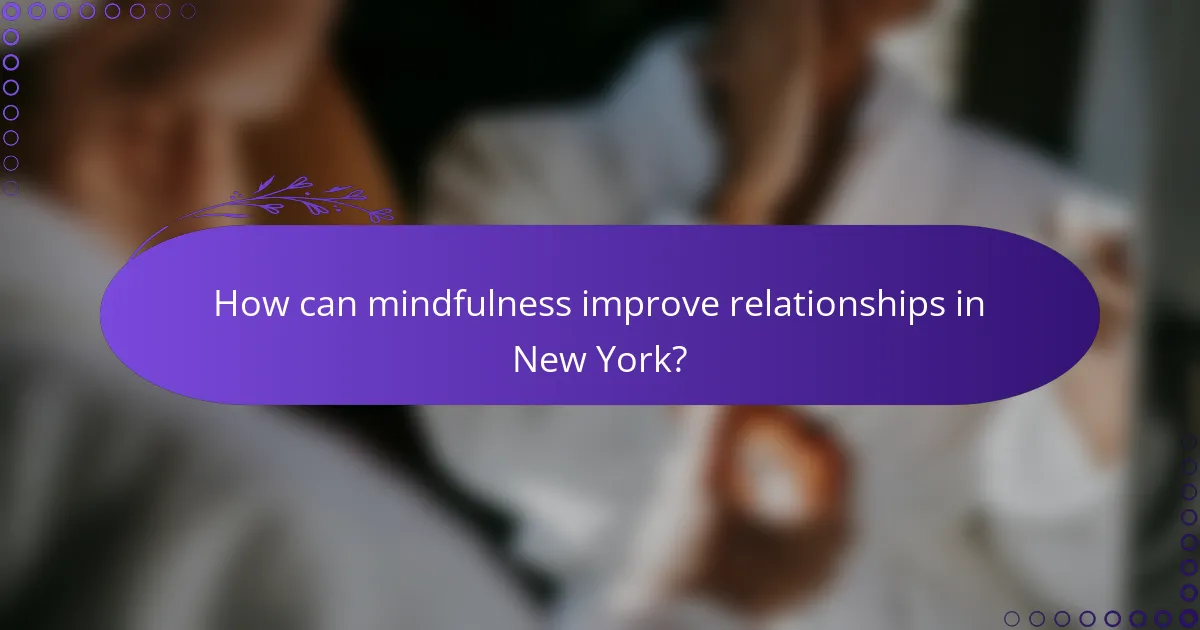
How can mindfulness improve relationships in New York?
Mindfulness can significantly enhance relationships in New York by fostering better communication, emotional awareness, and connection between partners. Practicing mindfulness encourages couples to be present with each other, leading to deeper understanding and reduced conflict.
Enhanced communication skills
Mindfulness improves communication by encouraging active listening and thoughtful responses. Couples who practice mindfulness are more likely to express their feelings clearly and without judgment, which helps in avoiding misunderstandings.
For example, setting aside a few minutes each day to discuss feelings can enhance clarity. Couples can practice reflecting back what they hear to ensure mutual understanding, which strengthens their dialogue.
Increased emotional awareness
Being mindful helps partners become more aware of their own emotions and those of their significant other. This heightened awareness allows couples to identify emotional triggers and respond more compassionately.
Couples can benefit from regular check-ins about their feelings, which can prevent emotional buildup. Practicing techniques like deep breathing or meditation together can also enhance this emotional awareness.
Reduced stress levels
Mindfulness practices, such as meditation and deep breathing, can significantly lower stress levels for couples. Lower stress contributes to a more peaceful home environment, which is essential for nurturing relationships.
Couples in New York can take advantage of local mindfulness classes or online resources to learn stress-reduction techniques. Engaging in these practices together can create a supportive atmosphere that benefits both partners.
Strengthened emotional connection
Mindfulness fosters a deeper emotional connection by encouraging couples to share their experiences and feelings openly. This practice helps partners feel more valued and understood, which strengthens their bond.
Simple activities, such as sharing gratitude or positive affirmations daily, can enhance this connection. Couples can also engage in mindfulness exercises together, such as yoga or nature walks, to deepen their emotional ties.
Improved conflict resolution
Mindfulness equips couples with tools to handle conflicts more effectively. By staying present and calm during disagreements, partners can approach issues with a clearer mindset and a focus on resolution rather than escalation.
Practicing mindfulness techniques, like pausing before responding during a conflict, can help couples avoid reactive behaviors. Establishing ground rules for discussions, such as no interruptions, can also facilitate healthier conflict resolution.
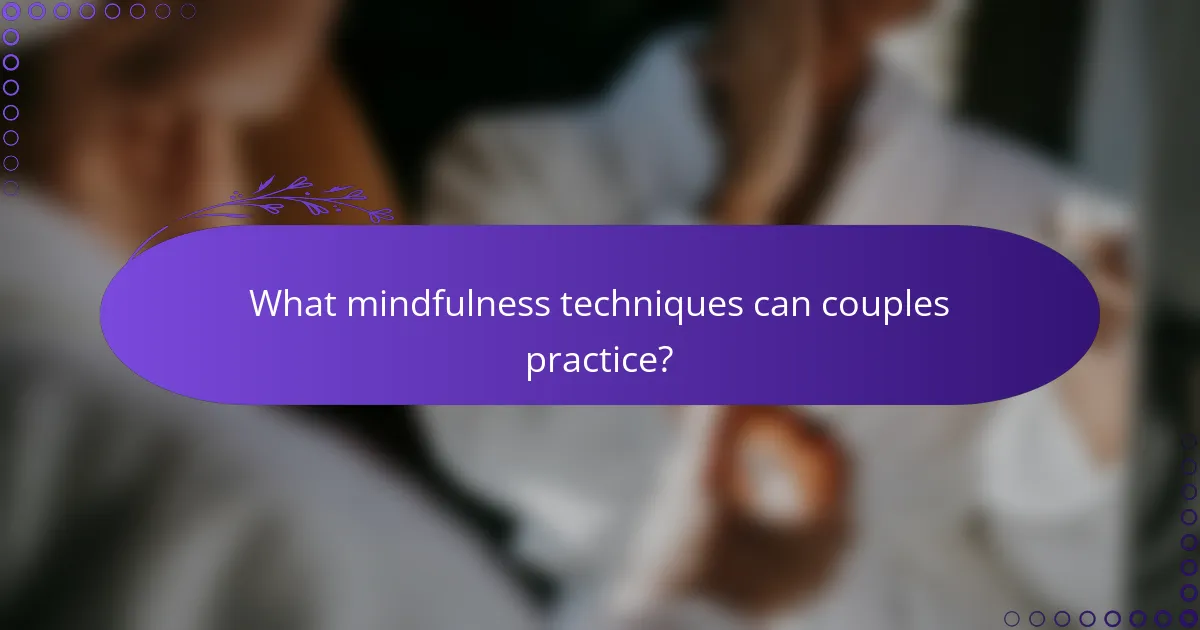
What mindfulness techniques can couples practice?
Couples can practice various mindfulness techniques to enhance their relationship, improve communication, and deepen their emotional connection. These techniques include mindful breathing, meditation, gratitude journaling, and mindful listening, each offering unique benefits for couples looking to cultivate awareness and presence together.
Mindful breathing exercises
Mindful breathing exercises help couples center themselves and connect with each other. By focusing on their breath, partners can reduce stress and enhance their emotional bond. A simple exercise involves sitting together, closing the eyes, and inhaling deeply for a count of four, holding for four, and exhaling for four, repeating this cycle for several minutes.
To make it more engaging, couples can synchronize their breathing, creating a shared rhythm that fosters intimacy. Practicing this daily, even for just a few minutes, can significantly enhance emotional awareness and presence in the relationship.
Couples meditation sessions
Couples meditation sessions provide a structured way for partners to connect on a deeper level. Setting aside time each week for guided meditation can help couples cultivate mindfulness together. They can use apps or online resources that offer specific sessions designed for couples, focusing on themes like love, gratitude, or compassion.
During these sessions, partners can sit facing each other, hold hands, and share their intentions for the practice. This not only enhances their meditation experience but also strengthens their emotional connection, making it a valuable addition to their routine.
Gratitude journaling together
Gratitude journaling together encourages couples to reflect on positive aspects of their relationship. By writing down things they appreciate about each other, partners can foster a sense of gratitude and positivity. Setting a regular time, such as once a week, to share their entries can deepen their understanding and appreciation for one another.
Couples can create a shared journal or use separate notebooks, but the key is to discuss their entries openly. This practice not only enhances emotional intimacy but also shifts focus away from challenges, promoting a more positive outlook on their relationship.
Mindful listening practices
Mindful listening practices involve giving full attention to one another during conversations. This means setting aside distractions, making eye contact, and truly hearing what the partner is saying without planning a response. Couples can practice this by taking turns speaking for a few minutes while the other listens attentively.
To enhance this practice, partners can use prompts such as “What made you happy today?” or “What challenges are you facing?” This encourages open dialogue and helps partners feel valued and understood, which is essential for a healthy relationship.
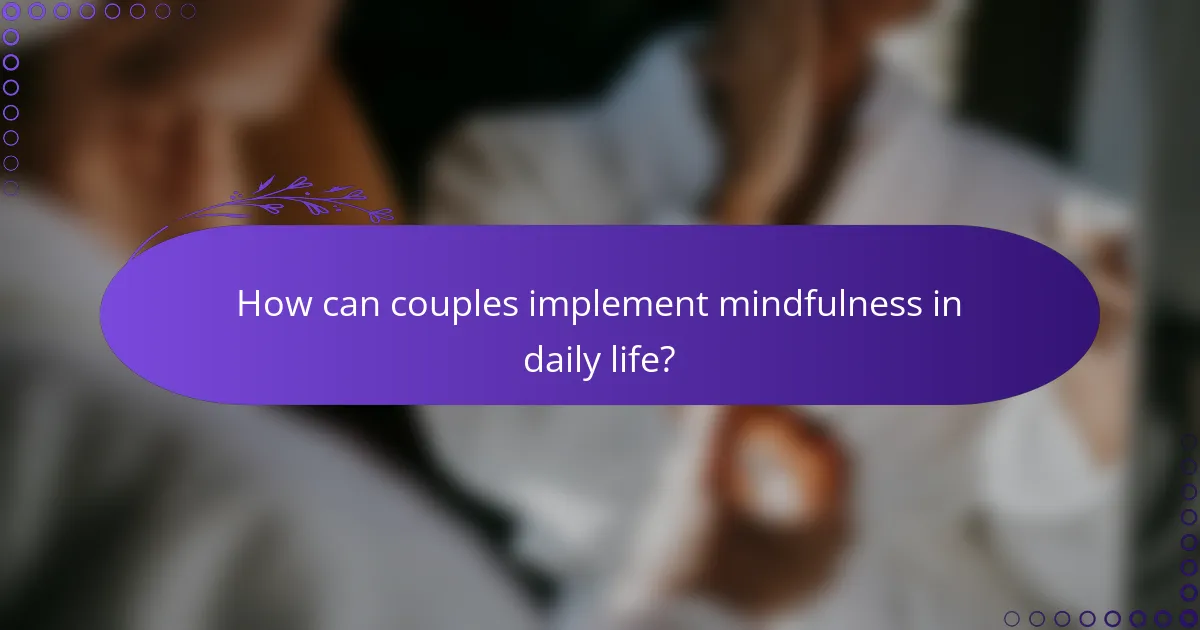
How can couples implement mindfulness in daily life?
Couples can implement mindfulness in daily life by integrating simple practices that promote awareness and presence in their interactions. This can enhance communication, reduce stress, and strengthen emotional connections.
Setting daily mindfulness reminders
Setting daily mindfulness reminders can help couples stay focused on being present with each other. Consider using phone alarms or sticky notes in common areas to prompt moments of reflection or deep breathing together.
Choose specific times, such as during breakfast or before bed, to pause and check in with each other. This practice can foster a routine of mindfulness that becomes a natural part of your day.
Creating a shared mindfulness space
Creating a shared mindfulness space at home can provide a dedicated area for relaxation and connection. This could be a cozy corner with comfortable seating, calming decor, and items that promote tranquility, such as candles or plants.
Encourage each other to use this space for activities like meditation, reading, or simply enjoying quiet time together. Having a designated area can make mindfulness feel more intentional and special.
Incorporating mindfulness into date nights
Incorporating mindfulness into date nights can transform ordinary outings into meaningful experiences. Choose activities that allow for connection, such as a quiet dinner where you focus on savoring each bite and engaging in deep conversation.
Consider trying mindfulness exercises together during your date, like a guided meditation or a nature walk where you pay attention to your surroundings. This can enhance your bond and create lasting memories.
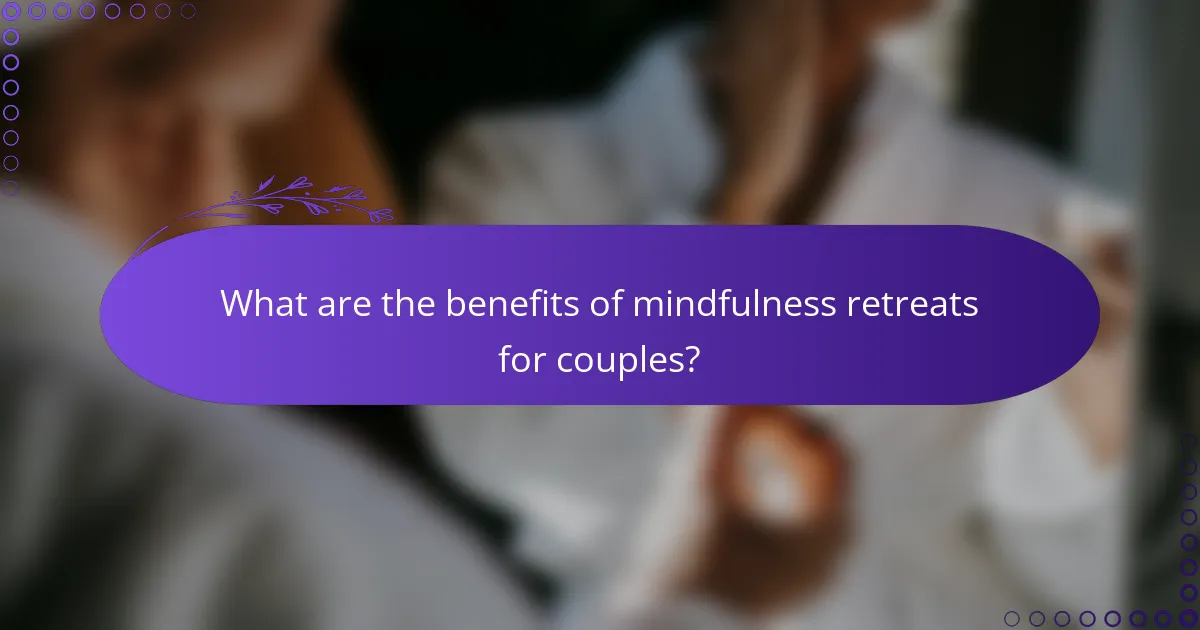
What are the benefits of mindfulness retreats for couples?
Mindfulness retreats for couples offer numerous benefits, including enhanced emotional connection and improved communication. These experiences allow partners to engage deeply with each other while learning mindfulness techniques that can strengthen their relationship.
Deepened connection through shared experiences
Participating in mindfulness retreats fosters a unique bond between couples as they navigate activities together. Engaging in practices like meditation, yoga, or nature walks encourages partners to share their thoughts and feelings in a supportive environment.
These shared experiences can lead to greater empathy and understanding, helping couples to reconnect on a deeper level. For instance, couples might find themselves opening up about personal challenges, leading to stronger emotional ties.
Expert guidance from mindfulness instructors
Mindfulness retreats typically feature experienced instructors who guide couples through various practices. These experts provide valuable insights and techniques that couples can use to enhance their daily lives.
Instructors often tailor sessions to address relationship dynamics, helping couples learn how to communicate more effectively and resolve conflicts. This professional guidance can be particularly beneficial for couples facing challenges in their relationship.
Opportunity for digital detox
Many mindfulness retreats encourage participants to disconnect from technology, creating a space for genuine interaction. This digital detox allows couples to focus solely on each other without the distractions of phones or social media.
By stepping away from screens, couples can engage in meaningful conversations and activities, fostering intimacy. This break from technology can lead to a renewed appreciation for each other and the relationship as a whole.
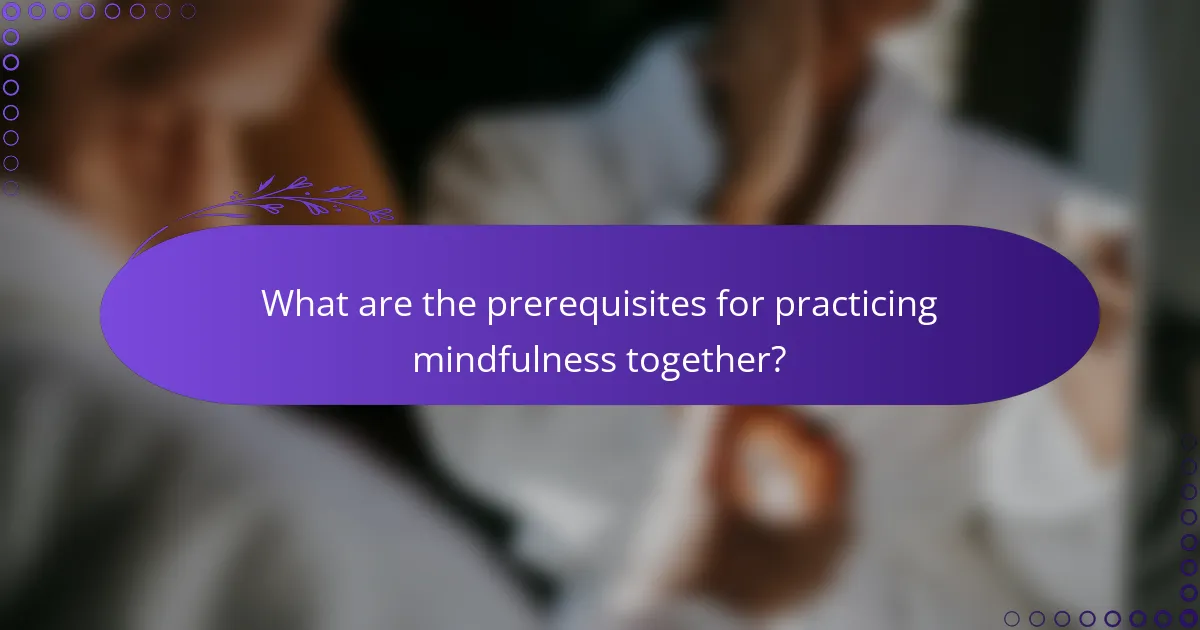
What are the prerequisites for practicing mindfulness together?
Practicing mindfulness together requires a foundation of trust, openness, and a willingness to engage in the process. Couples should be prepared to communicate honestly about their feelings and expectations to create a supportive environment for mindfulness activities.
Open communication about expectations
Open communication is essential for couples to align their expectations regarding mindfulness practices. Discussing what each partner hopes to achieve can help prevent misunderstandings and foster a collaborative atmosphere.
Consider setting aside time to talk about your individual goals. For instance, one partner may seek stress relief, while the other may want to enhance emotional intimacy. Identifying these goals can guide your mindfulness journey together.
To facilitate this communication, try using “I” statements to express your feelings and desires. This approach minimizes defensiveness and encourages a more productive dialogue. Avoid vague terms; instead, be specific about your needs and how you envision practicing mindfulness together.


